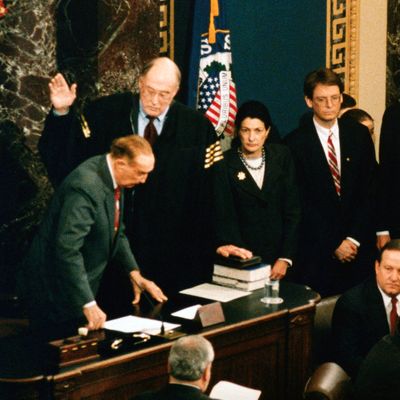
In an apparent compromise between a president who would prefer no trial at all and some of his defenders who want an elaborate counter-trial of Joe and Hunter Biden, with perhaps Hillary Clinton and Robert Mueller in the dock as well, the buzz after a White House meeting with Team Trump and key Senate Republicans is a two-week trial, according to the Washington Post:
A group of Republican senators and senior White House officials met privately Thursday to map out a strategy for a potential impeachment trial of President Trump, including rapid proceedings in the Senate that could be limited to about two weeks, according to multiple officials familiar with the talks.
The prospect of an abbreviated trial is viewed by several Senate Republicans as a favorable middle ground — substantial enough to give the proceedings credence without risking greater damage to Trump by dragging on too long.
Trump has reportedly been pushing for the Senate to dismiss the articles of impeachment against him preemptively, at the risk of losing the claim of “exoneration” that a trial, however brief and phony, might support to those who had no idea what was going on. But Senate Republicans thought that might be a bit off message given their whining about House Democrats not following constitutional and congressional protocols in the impeachment inquiry. Besides, a motion to dismiss would require 51 votes, allowing for just two Republican defections.
The discussions assumed a January start date for the trial, based on the assumption the House would pass articles of impeachment in December. That timetable would comport with the one used during the Clinton-impeachment process: The House impeached the 42nd president on December 19, 1998, and the trial began on January 7, 1999 (it ended with Clinton’s acquittal on February 12).
While the prospect of a quick trial is good news for the six United States senators currently running for president, the proposed timetable would cut deeply into the time they would normally spend crisscrossing Iowa (which has its caucus on February 3) and New Hampshire (whose primary is on February 11). Indeed, one of the arguments apparently raised by long-trial Republican advocates was that dragging it out would usefully interfere with the Democratic contest.
It’s clear Trump was heavily represented during the GOP discussion:
In addition to [Lindsey] Graham, the meeting Thursday included Republican Sens. Mike Lee (Utah), Ron Johnson (Wis.), John Neely Kennedy (La.), Ted Cruz (Texas) and Tom Cotton (Ark.), along with [White House Counsel Pat] Cipollone; acting chief of staff Mick Mulvaney; senior adviser and Trump son-in-law Jared Kushner; and counselor Kellyanne Conway, according to officials familiar with the discussions, many of whom requested anonymity to disclose internal deliberations.
It’s less clear where Mitch McConnell was during this meeting, but you can be sure his views were clearly communicated by other senators.






























